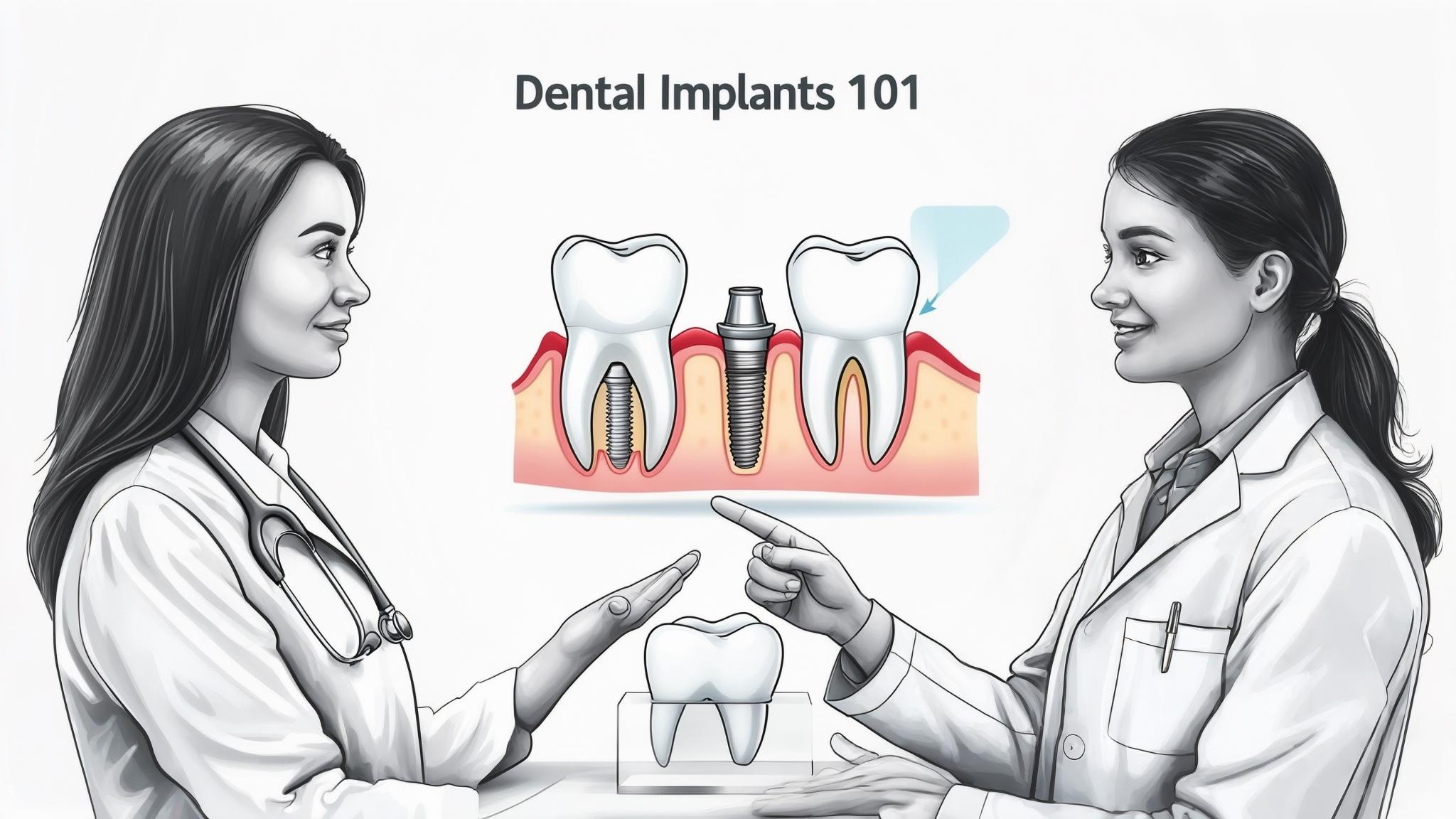Introduction
Dental implants have revolutionized modern dentistry, offering a reliable solution for replacing missing teeth. Unlike traditional bridges or dentures, implants provide a permanent, natural-looking option that can significantly enhance your quality of life. However, it's common for patients to have questions and concerns about this procedure. This article aims to address the most frequently asked questions about dental implants, providing clear and expert answers to help you make informed decisions.
What are Dental Implants?
Dental implants are artificial tooth roots, typically made of titanium, that are surgically placed into the jawbone. They serve as a sturdy foundation for attaching replacement teeth like crowns. The implant itself consists of three main components:
- Implant Post: This is the screw-like part that is inserted into the jawbone.
- Abutment: A connector that holds the crown to the implant.
- Crown: The visible part of the tooth, custom-made to match your natural teeth.
The dental implant procedure involves placing the implant post into the jawbone, allowing it to fuse with the bone over time, a process known as osseointegration. Once this fusion is complete, the abutment and crown are attached, completing the restoration.
Who is a Candidate for Dental Implants?
Not everyone is an ideal candidate for dental implants. Generally, candidates should have:
- Adequate bone density to support the implant.
- Good oral health, with no untreated gum disease.
- Overall good health, as certain chronic illnesses can affect healing.
Age is not a strict barrier, but younger patients may need to wait until their jawbone has fully developed. Conditions like smoking or uncontrolled diabetes can also impact candidacy. A thorough dental evaluation is crucial to determine if implants are suitable for you.
What is the Dental Implant Procedure Like?
The dental implant process involves several stages:
- Initial Consultation and Planning: Your dentist will assess your oral health and take X-rays to plan the procedure.
- Implant Placement Surgery: The implant post is surgically placed into the jawbone under local anesthesia.
- Healing and Osseointegration: This can take several months as the implant fuses with the bone.
- Abutment Placement and Crown Fitting: Once healed, the abutment is attached, and a custom crown is placed.
Overall, the timeline can range from a few months to over a year, depending on individual healing and any additional procedures needed.
What Are the Benefits of Dental Implants?
Dental implants offer several advantages over other tooth replacement options:
- Longevity and Durability: Implants can last a lifetime with proper care.
- Improved Aesthetics and Functionality: They look and feel like natural teeth.
- Enhanced Oral Health: Unlike bridges, implants don't require altering adjacent teeth.
These benefits make dental implants a highly desirable option for many patients.
What Are the Risks and Complications?
As with any surgery, dental implants carry some risks, including:
- Infection at the implant site
- Nerve damage
- Implant failure due to lack of osseointegration
Choosing an experienced dental professional can significantly reduce these risks. Discuss any concerns with your dentist before proceeding.
How Much Do Dental Implants Cost?
The cost of dental implants varies based on several factors:
- Consultation and Planning: Initial assessments and imaging.
- Surgery and Materials: The implant, abutment, and crown.
- Location and Additional Procedures: Geographic location and any preparatory procedures, like bone grafting.
Insurance may cover part of the cost, and many dental offices offer financing options to help manage expenses.
How Do I Care for Dental Implants?
Caring for dental implants is similar to caring for natural teeth:
- Daily Oral Hygiene: Brush and floss regularly to prevent plaque buildup.
- Regular Dental Check-Ups: Routine visits ensure the health of your implants and surrounding teeth.
- Diet Considerations: Avoid hard foods that could damage the crown.
Proper care will help maintain the longevity of your implants.
What is the Recovery Process Like?
Recovery from dental implant surgery involves:
- Timeline for Healing: Initial healing takes a few weeks, but full osseointegration can take months.
- Common Post-Operative Symptoms: Swelling, bruising, and minor discomfort are normal.
- Follow Post-Operative Care Instructions: Adhering to your dentist's advice ensures a smooth recovery.
Frequently Asked Questions (FAQs)
- How long do dental implants last? With proper care, they can last a lifetime.
- Can dental implants be removed? Yes, but removal is complex and typically avoided unless necessary.
- What if I have lost a significant amount of bone? Bone grafting may be an option to build up the bone before implant placement.
Conclusion
Dental implants play a crucial role in restoring smiles and improving oral health. By understanding the procedure and its benefits, you can make informed decisions about your dental care. Always consult with your dentist for personalized advice and to explore if dental implants are right for you.
Call to Action
If you're considering dental implants or have more questions, don't hesitate to reach out to your dental professional for a consultation. Contact us or visit our website for more information.
References
For further reading, consult reputable sources such as the American Dental Association and Mayo Clinic. These organizations provide comprehensive guidelines and information on dental implants.

